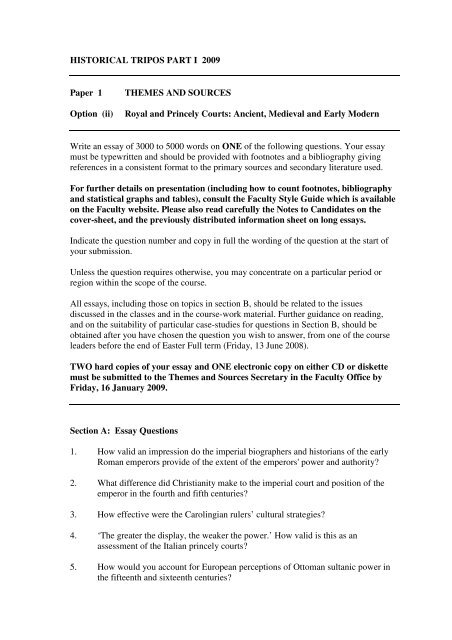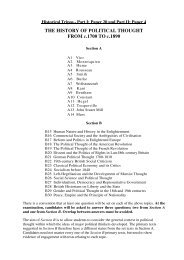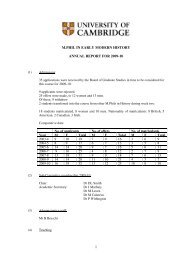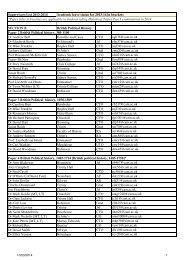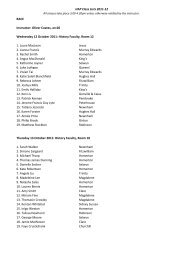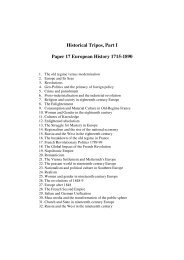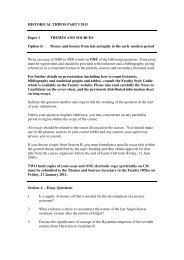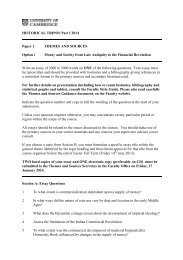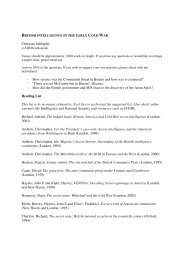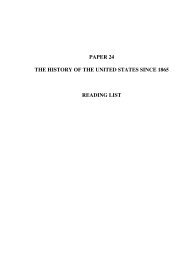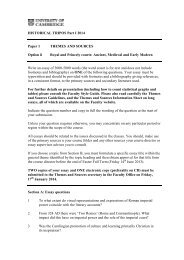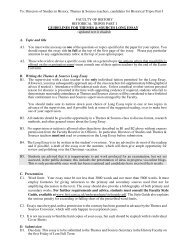(ii) Royal and Princely Courts: Ancient, Medieval and Early
(ii) Royal and Princely Courts: Ancient, Medieval and Early
(ii) Royal and Princely Courts: Ancient, Medieval and Early
You also want an ePaper? Increase the reach of your titles
YUMPU automatically turns print PDFs into web optimized ePapers that Google loves.
HISTORICAL TRIPOS PART I 2009<br />
Paper 1<br />
Option (<strong>ii</strong>)<br />
THEMES AND SOURCES<br />
<strong>Royal</strong> <strong>and</strong> <strong>Princely</strong> <strong>Courts</strong>: <strong>Ancient</strong>, <strong>Medieval</strong> <strong>and</strong> <strong>Early</strong> Modern<br />
Write an essay of 3000 to 5000 words on ONE of the following questions. Your essay<br />
must be typewritten <strong>and</strong> should be provided with footnotes <strong>and</strong> a bibliography giving<br />
references in a consistent format to the primary sources <strong>and</strong> secondary literature used.<br />
For further details on presentation (including how to count footnotes, bibliography<br />
<strong>and</strong> statistical graphs <strong>and</strong> tables), consult the Faculty Style Guide which is available<br />
on the Faculty website. Please also read carefully the Notes to C<strong>and</strong>idates on the<br />
cover-sheet, <strong>and</strong> the previously distributed information sheet on long essays.<br />
Indicate the question number <strong>and</strong> copy in full the wording of the question at the start of<br />
your submission.<br />
Unless the question requires otherwise, you may concentrate on a particular period or<br />
region within the scope of the course.<br />
All essays, including those on topics in section B, should be related to the issues<br />
discussed in the classes <strong>and</strong> in the course-work material. Further guidance on reading,<br />
<strong>and</strong> on the suitability of particular case-studies for questions in Section B, should be<br />
obtained after you have chosen the question you wish to answer, from one of the course<br />
leaders before the end of Easter Full term (Friday, 13 June 2008).<br />
TWO hard copies of your essay <strong>and</strong> ONE electronic copy on either CD or diskette<br />
must be submitted to the Themes <strong>and</strong> Sources Secretary in the Faculty Office by<br />
Friday, 16 January 2009.<br />
Section A: Essay Questions<br />
1. How valid an impression do the imperial biographers <strong>and</strong> historians of the early<br />
Roman emperors provide of the extent of the emperors' power <strong>and</strong> authority<br />
2. What difference did Christianity make to the imperial court <strong>and</strong> position of the<br />
emperor in the fourth <strong>and</strong> fifth centuries<br />
3. How effective were the Carolingian rulers’ cultural strategies<br />
4. ‘The greater the display, the weaker the power.’ How valid is this as an<br />
assessment of the Italian princely courts<br />
5. How would you account for European perceptions of Ottoman sultanic power in<br />
the fifteenth <strong>and</strong> sixteenth centuries
6. To what extent did the royal court function as a centre of cultural life<br />
in Engl<strong>and</strong> in the late fifteenth <strong>and</strong> the sixteenth centuries<br />
7. How crucial was the absence of the monarchs of Spain <strong>and</strong> Portugal in the<br />
development of princely courts in Latin America<br />
8. What impact did the German background of the Hanoverian kings George I <strong>and</strong><br />
George II have on their English courts<br />
Section B: Topics<br />
9. Diplomacy.<br />
10. Government <strong>and</strong> the court.<br />
11. Palaces <strong>and</strong> their function.<br />
12. Princes <strong>and</strong> religion.<br />
13. Representations of power.<br />
14. The legacy of Rome.<br />
15. Gender <strong>and</strong> politics.<br />
16. The court <strong>and</strong> the arts.


